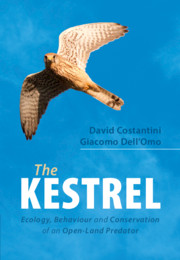Book contents
- The Kestrel
- The Kestrel
- Copyright page
- Contents
- Preface
- 1 Systematics and Evolution of Kestrels
- 2 Feeding Ecology
- 3 Habitat Use
- 4 Breeding Density and Nest Site Selection
- 5 Colourations, Sexual Selection and Mating Behaviour
- 6 The Reproductive Cycle: From Egg Laying to Offspring Care
- 7 Ecological Physiology and Immunology
- 8 Environmental Toxicology
- 9 Movement Ecology
- 10 Conservation Status and Population Dynamics
- References
- Index
- Plate Section (PDF Only)
7 - Ecological Physiology and Immunology
Published online by Cambridge University Press: 29 August 2020
- The Kestrel
- The Kestrel
- Copyright page
- Contents
- Preface
- 1 Systematics and Evolution of Kestrels
- 2 Feeding Ecology
- 3 Habitat Use
- 4 Breeding Density and Nest Site Selection
- 5 Colourations, Sexual Selection and Mating Behaviour
- 6 The Reproductive Cycle: From Egg Laying to Offspring Care
- 7 Ecological Physiology and Immunology
- 8 Environmental Toxicology
- 9 Movement Ecology
- 10 Conservation Status and Population Dynamics
- References
- Index
- Plate Section (PDF Only)
Summary
The quantification of physiological and immunological functions provides fundamental information on individual state. It fosters our understanding of the costs of and constraints on life-history strategies. Research in this area on kestrels has mainly focused on immunity, energetics, hormones and antioxidants. This chapter discusses the factors that impact the immune function and describes a number of parasites and pathogens that can be detected in kestrels. It shows how the different phases of reproduction face males and females with different energetic and physiological demands. It discusses the costs associated with sibling competition, and how male and female nestlings may differ in how they optimise the trade-off between growth and self-maintenance. Finally, this chapter describes the moult phase, which represents an understudied feature of kestrel biology.
Keywords
- Type
- Chapter
- Information
- The KestrelEcology, Behaviour and Conservation of an Open-Land Predator, pp. 108 - 133Publisher: Cambridge University PressPrint publication year: 2020

